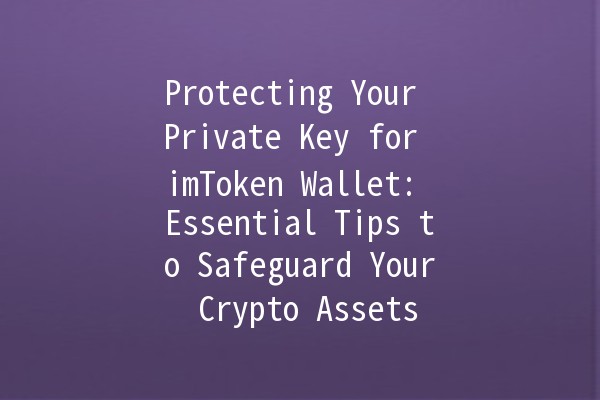In the everevolving world of cryptocurrency, the security of your digital assets is of utmost importance. One of the critical components in ensuring the safety of your cryptocurrency holdings, particularly when using wallets like imToken, is the protection of your private key. This article aims to provide you with practical tips and techniques to enhance the security of your private keys, ensuring that your assets remain safe from unauthorized access and potential theft.
Before diving into specific protection techniques, it’s vital to grasp what a private key is and why its security matters. A private key is a cryptographic code that allows you to access and manage your cryptocurrency holdings. If someone gains access to your private key, they can control your assets, potentially leading to irreversible losses.
With the increasing frequency of hacking incidents and scams targeting cryptocurrency users, understanding how to safeguard your private key is crucial for anyone using imToken or similar wallets.
Explanation: Passwords serve as the first line of defense against unauthorized access. Always use a strong, unique password for your imToken wallet. A strong password typically includes a mix of uppercase and lowercase letters,numbers, and symbols, making it difficult for attackers to guess.
Practical Application: Consider using a password manager to generate and store complex passwords. For example, instead of using "password123," create a password like "G8@#Fv$1Qx!" which is far more difficult to crack.

Explanation: Twofactor authentication adds an extra layer of security by requiring two forms of identification before granting access to your wallet. This usually involves something you know (your password) and something you have (a verification code sent to your phone or email).
Practical Application: Check if imToken supports 2FA and enable it. This setup will require a code sent to your phone each time you log in, significantly reducing the chances of unauthorized access even if someone steals your password.
Explanation: Hardware wallets are specialized devices designed for securely storing cryptocurrency private keys offline. They are less susceptible to hacking because they are not connected to the internet.
Practical Application: If you hold significant amounts of cryptocurrency, consider investing in a reputable hardware wallet like Ledger or Trezor. Store your private keys on this device and only connect it to your computer when necessary to keep your assets safe from online threats.
Explanation: Regular backups help ensure that you don’t lose access to your funds in the event of device failure or theft. By backing up your wallet information, including your private keys, you can restore access easily.
Practical Application: After creating your imToken wallet, make a backup of your seed phrase (a series of words given when you set up your wallet) and store it in a secure, offline location, such as a safe. Do not save it on your computer or cloud storage to avoid potential hacking incidents.
Explanation: Phishing attacks involve deceitful practices to obtain sensitive information by impersonating legitimate sources. Cybercriminals may send emails or create websites that look official, intending to trick users into revealing their private keys or passwords.
Practical Application: Always doublecheck website URLs and email addresses before entering any sensitive information. Use bookmarks for trusted sites like imToken to avoid accidentally visiting malicious sites. Educate yourself about common phishing tactics and stay vigilant.
Maintaining the security of your private key and overall cryptocurrency holdings involves diligence and systematic practices. Here’s a quick summary of the best practices discussed:
Strong passwords: Unique and complex.
Twofactor authentication: A musthave for added security.
Hardware wallets: Invest in one for offline storage.
Regular backups: Store your backup information securely.
Awareness of phishing: Stay educated about potential scams.
Answer: A private key is a confidential piece of information that allows you to access and control your cryptocurrency. The public key, on the other hand, is derived from the private key and can be shared with others to receive funds. While anyone can see your public key, it’s crucial that the private key remains a secret to maintain control over your assets.
Answer: Unfortunately, if you lose your private key and do not have a backup of your seed phrase, you will not be able to recover your assets. This is why it is essential to create and securely store backups of your wallet data, including your seed phrase, when initially setting up your wallet.
Answer: Storing your private key on your phone can be risky, especially if your phone is not secure. If you must store it on your mobile device, ensure that you’re using a passwordprotected note or encrypted file. A more secure option would be to use a hardware wallet or keep your private key offline.
Answer: Signs of a compromised wallet may include unauthorized transactions, unusual activity in your account, or receiving alerts about login attempts from unfamiliar devices. If you suspect that your wallet may have been compromised, immediately transfer your funds to a secure wallet and change your passwords.
Answer: Report any phishing attempts to the appropriate authorities and do not engage with the sender. Ensure you do not click on any links or provide any information. Always verify the source if you receive unexpected requests for sensitive data.
Answer: You cannot change your private key directly. However, you can create a new wallet and transfer your funds to this new wallet if you feel your existing private key may be compromised. In this case, ensure that your new wallet is secured with strong protection methods.
As cryptocurrency technology continues to evolve, so do the methods used by cybercriminals. Therefore, remaining updated on best practices for safeguarding your digital assets is critical. Engaging with the community, regularly checking for updates from imToken, and following security blogs can help you stay informed about emerging threats and solutions.
By implementing these strategies, you can significantly enhance the security of your imToken wallet and protect your private key, ensuring that your cryptocurrency remains safe from potential threats.